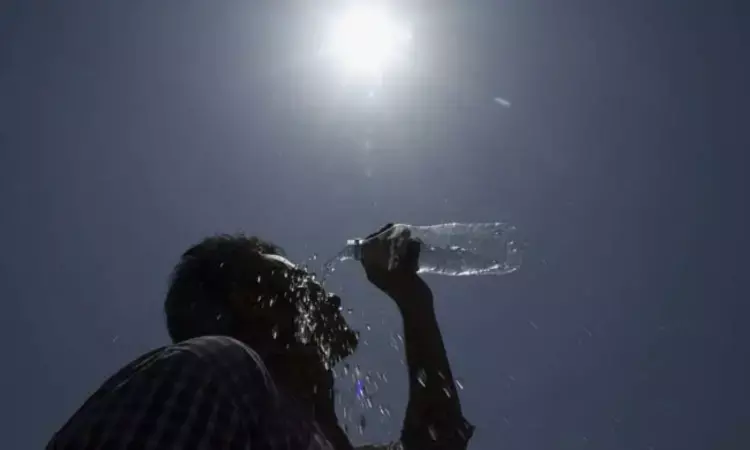- Home
- Medical news & Guidelines
- Anesthesiology
- Cardiology and CTVS
- Critical Care
- Dentistry
- Dermatology
- Diabetes and Endocrinology
- ENT
- Gastroenterology
- Medicine
- Nephrology
- Neurology
- Obstretics-Gynaecology
- Oncology
- Ophthalmology
- Orthopaedics
- Pediatrics-Neonatology
- Psychiatry
- Pulmonology
- Radiology
- Surgery
- Urology
- Laboratory Medicine
- Diet
- Nursing
- Paramedical
- Physiotherapy
- Health news
- Fact Check
- Bone Health Fact Check
- Brain Health Fact Check
- Cancer Related Fact Check
- Child Care Fact Check
- Dental and oral health fact check
- Diabetes and metabolic health fact check
- Diet and Nutrition Fact Check
- Eye and ENT Care Fact Check
- Fitness fact check
- Gut health fact check
- Heart health fact check
- Kidney health fact check
- Medical education fact check
- Men's health fact check
- Respiratory fact check
- Skin and hair care fact check
- Vaccine and Immunization fact check
- Women's health fact check
- AYUSH
- State News
- Andaman and Nicobar Islands
- Andhra Pradesh
- Arunachal Pradesh
- Assam
- Bihar
- Chandigarh
- Chattisgarh
- Dadra and Nagar Haveli
- Daman and Diu
- Delhi
- Goa
- Gujarat
- Haryana
- Himachal Pradesh
- Jammu & Kashmir
- Jharkhand
- Karnataka
- Kerala
- Ladakh
- Lakshadweep
- Madhya Pradesh
- Maharashtra
- Manipur
- Meghalaya
- Mizoram
- Nagaland
- Odisha
- Puducherry
- Punjab
- Rajasthan
- Sikkim
- Tamil Nadu
- Telangana
- Tripura
- Uttar Pradesh
- Uttrakhand
- West Bengal
- Medical Education
- Industry
Rising temperature tied to risk of complications and hospitalization among diabetes patients

Japan: Rising temperatures are associated with the risk of hospitalizations for a hyperosmolar hyperglycemic state (HHS), diabetic ketoacidosis (DKA), and hypoglycemia in diabetes patients, a recent study in the journal Environment International has stated.
With global warming, studies have shown a rise in extreme heat events. Heat exposure has been associated with adverse health outcomes, including mortality. Patients with diabetes, because of their pathological conditions such as impaired thermoregulation and dehydration risk, are specifically vulnerable to heat exposure.
Heat exposure in an ambient temperature is tied to all-cause hospitalization and all-cause diabetes mortality in patients with diabetes. However, there is no clarity in the association between heat exposure and hospitalization for hyperglycemic emergencies, such as HHS, DKA, and hypoglycemia.
Considering the above, Takeo Fujiwara, Department of Global Health Promotion, Tokyo Medical and Dental University, Tokyo, Japan, and colleagues conducted the study to clarify the stance of heat exposure on the hospitalization for HHS, DKA, and hypoglycemia.
The researchers used distributed nonlinear lag model to evaluate heat exposure's nonlinear and lagged effects on hospitalization for hyperglycemic emergencies. For this purpose, the researchers extracted data on daily hospitalizations for hypoglycemia and hyperglycemic emergencies (i.e., HHS or DKA) from a nationwide administrative database in Japan. They linked it with temperature in each prefecture in Japan from the period 2012–2019.
Based on the study, the authors reported the following findings:
- The pooled relative risk (RR) for hyperglycemic emergencies of heat exposure and extreme heat effect over 0–3 lag days, respectively, was 1.27 and 1.64.
- The pooled RR for heat effect on hypoglycemia and extreme heat effect hospitalization over 0–3 lag days was 1.33 and 1.65.
- These associations were consistent by type of diabetes and type of hyperglycemic emergencies and were generally consistent by regions.
"To the best of our conscience, this is the first study that demonstrates the association between ambient temperature and hyperglycemic emergencies and hypoglycemia through utilizing distributed nonlinear lag model, which allows the assessment of the nonlinear and lag effects of ambient temperature," the researchers wrote. "The results from the previous studies examining the effects of ambient temperature on diabetes patients were limited to all-cause hospitalization and all-cause mortality.
"Our findings suggest that heat exposure is tied to an increased hospitalization risk of HHS, DKA, and hypoglycemia. The study may be helpful to guide preventive action for the risk of hypoglycemia and fatal hyperglycemic emergencies," they conclude.
Reference:
Miyamura K, Nawa N, Nishimura H, Fushimi K, Fujiwara T. Association between heat exposure and hospitalization for diabetic ketoacidosis, hyperosmolar hyperglycemic state, and hypoglycemia in Japan. Environ Int. 2022 Sep;167:107410. doi: 10.1016/j.envint.2022.107410. Epub 2022 Jul 13. PMID: 35868079
Dr Kamal Kant Kohli-MBBS, DTCD- a chest specialist with more than 30 years of practice and a flair for writing clinical articles, Dr Kamal Kant Kohli joined Medical Dialogues as a Chief Editor of Medical News. Besides writing articles, as an editor, he proofreads and verifies all the medical content published on Medical Dialogues including those coming from journals, studies,medical conferences,guidelines etc. Email: drkohli@medicaldialogues.in. Contact no. 011-43720751


